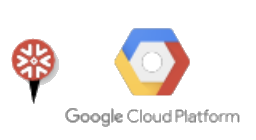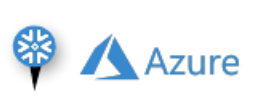Supported cloud regions¶
Regions let your organization choose where your data is geographically stored across your regional, national, and international operations. Regions also determine where your compute resources are provisioned.
Snowflake supports regions across all of the Snowflake-supported cloud platforms, grouped into three global geographic segments (North/South America, Europe/Middle East/Africa, and Asia Pacific/China).
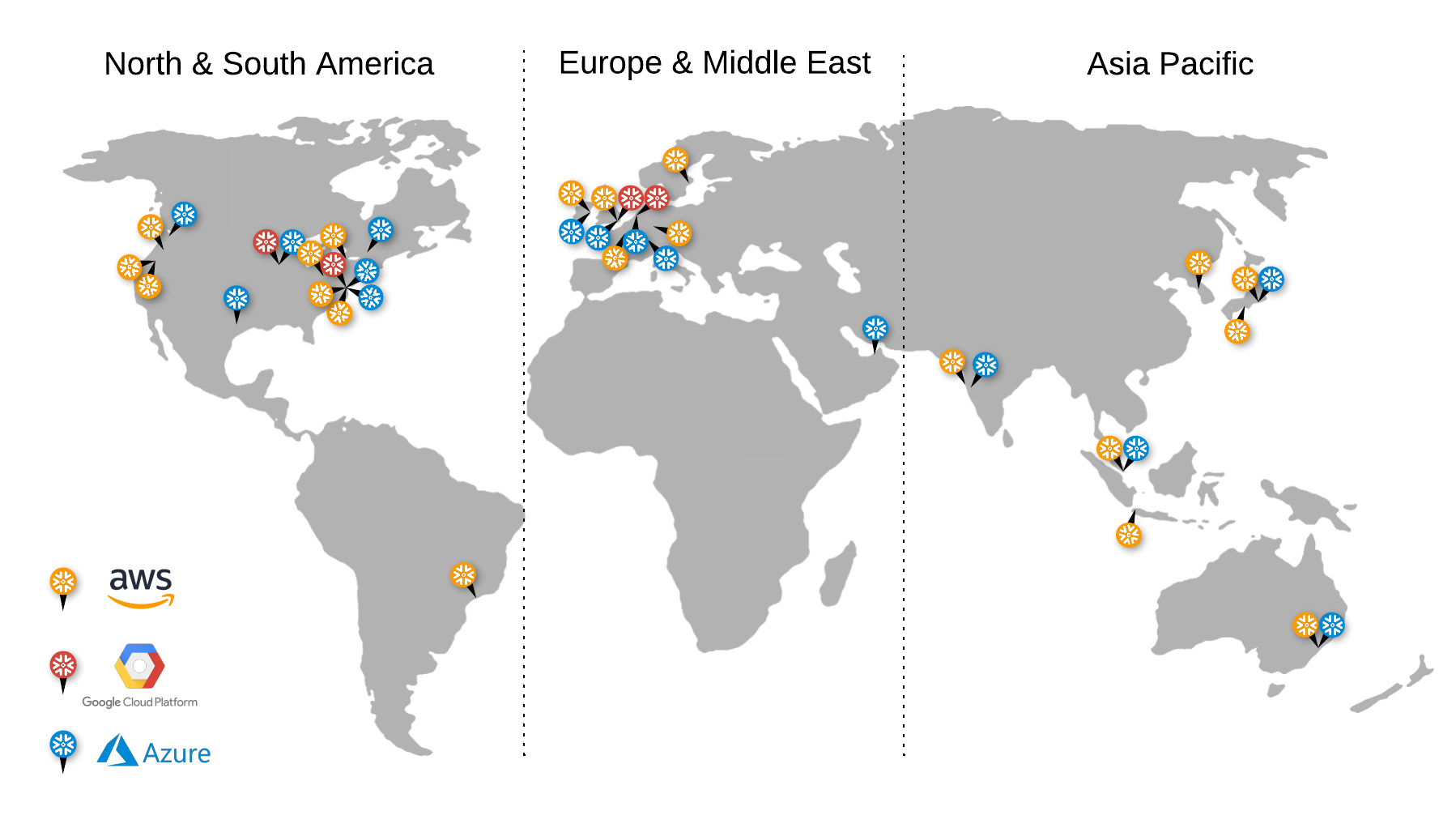
Important
Each Snowflake account is hosted in a single region. If you wish to use Snowflake across multiple regions, you must maintain a Snowflake account in each of the desired regions.
Note
For details about the cloud regions where your data can be hosted when using the Egress Cost Optimizer, see Optimizing data transfer costs with Egress Cost Optimizer documentation.
North and South America¶
These regions are supported for organizations that prefer or require their data to be stored in the United States, Canada, or Brazil. Multiple regions are provided to allow your organization to meet its individual compliance requirements for general purpose use.
Additional regions are provided in the United States for organizations that must comply with US government regulations.
Commercial regions¶
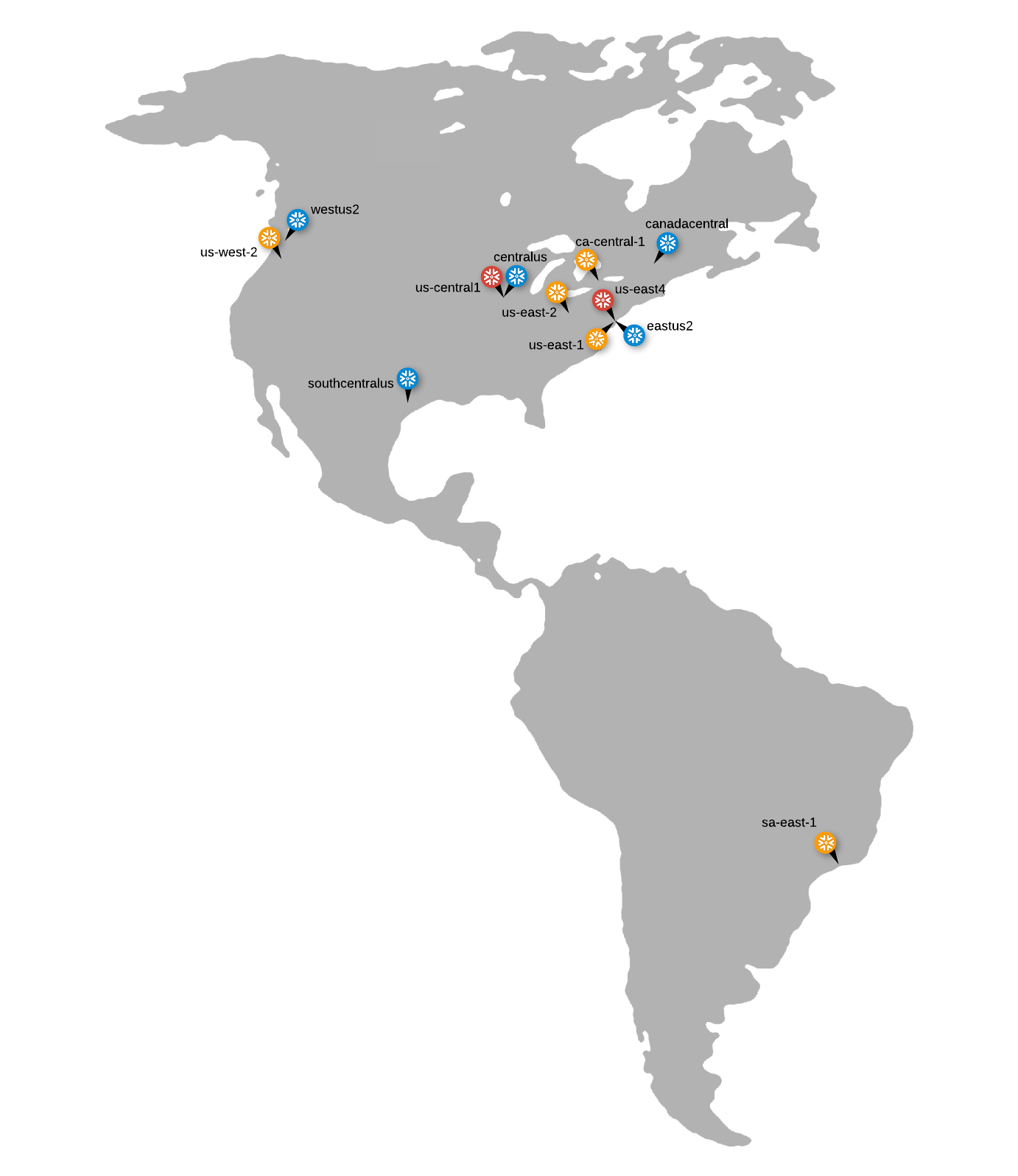
Snowflake supports the following regions in North America (U.S., Canada, and Mexico) and South America (Brazil) for general commercial use:
Cloud Platform |
Cloud Region ID [1] |
Region Name |
Additional Notes |
|---|---|---|---|
Amazon Web Services (AWS) |
|||
ca-central-1 |
Canada (Central) |
Completed assessment and supports compliance with Canadian government’s CCCS Medium Cloud Control Security Profile (fka, Protected B, Medium Integrity, Medium Availability [PB/M/M]) |
|
sa-east-1 |
South America (Sao Paulo) |
||
us-west-2 |
US West (Oregon) |
Also supports some U.S. government compliance. See U.S. regions supporting public sector workloads. |
|
us-east-2 |
US East (Ohio) |
||
us-east-1 |
US East (N. Virginia) |
Also supports some U.S. government compliance. See U.S. regions supporting public sector workloads. |
|
Google Cloud Platform (GCP) |
|||
us-central1 |
US Central1 (Iowa) |
||
us-east4 |
US East4 (N. Virginia) |
||
Microsoft Azure |
|||
canadacentral |
Canada Central (Toronto) |
Completed assessment and supports compliance with the CCCS Medium Cloud Control Security Profile (fka, Protected B, Medium Integrity, Medium Availability [PB/M/M]) |
|
centralus |
Central US (Iowa) |
||
eastus |
East US (Virginia) |
||
eastus2 |
East US 2 (Virginia) |
||
mexicocentral |
Mexico Central (Querétaro) |
||
southcentralus |
South Central US (Texas) |
Also supports some U.S. government compliance (see next section for details). |
|
westus2 |
West US 2 (Washington) |
||
[1] See the map preceding this table for the location of each supported region, labeled by cloud region ID.
U.S. regions supporting public sector workloads¶
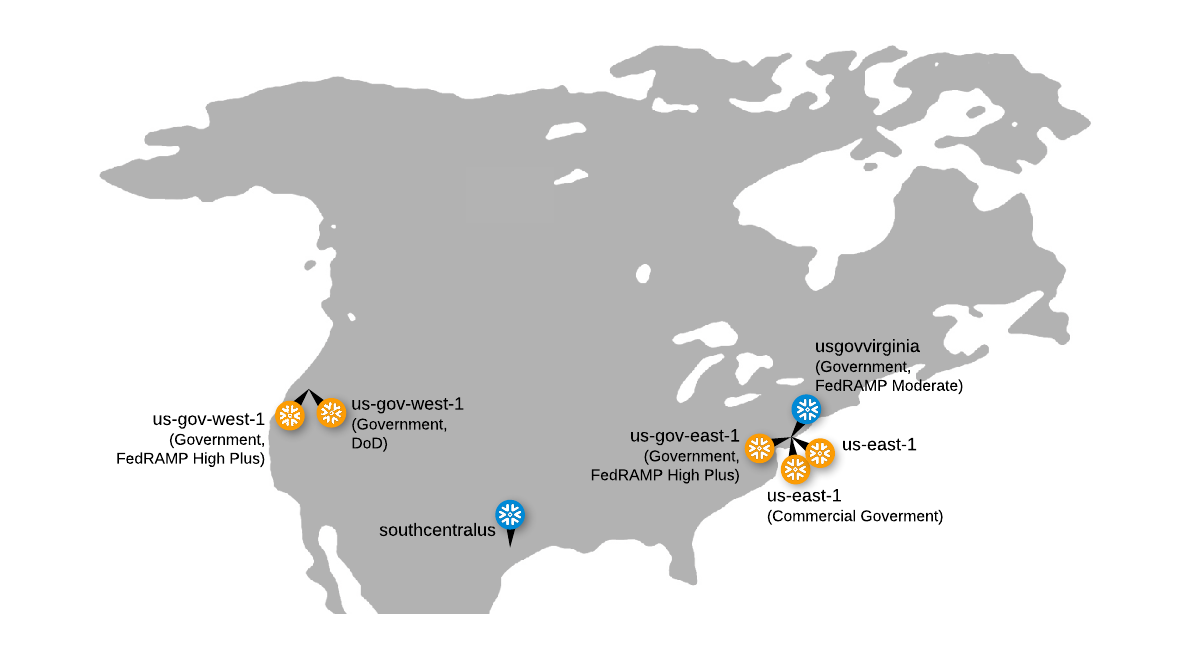
Snowflake makes the following regions available to customers that require compliance with common U.S. Federal and state government standards. These regions are only supported for Snowflake accounts on Business Critical Edition (or higher).
Note
If your Snowflake account is in a U.S. government region and you want to access data products that are offered privately or on the Snowflake Marketplace, or offer listings either privately or on the Snowflake Marketplace, you must review and acknowledge a cross-region disclaimer for your organization.
For details, see:
- U.S. commercial regions with some support for government standards
The following commercial regions meet the requirements for Snowflake’s compliance with the U.S. government standards set forth in the table below. By uploading workloads covered by the below compliance standards, customers agree to Snowflake’s U.S. Government Commercial Compliance Addendum.
Cloud Region ID
Region Name
Compliance standards
Amazon Web Services
us-east-1
US East (Commercial Gov - N. Virginia)
FIPS 140-2
DOJ Criminal Justice Information Systems (CJIS) Security Policy - Requires Supplemental Contract Terms
IRS Publication 1075 - Requires Supplemental Contract Terms
NIST 800-171
us-east-1
US East (N. Virginia)
us-west-2
US West (Commercial Gov - Oregon)
FIPS 140-2
DOJ Criminal Justice Information Systems (CJIS) Security Policy - Requires Supplemental Contract Terms
IRS Publication 1075 - Requires Supplemental Contract Terms
NIST 800-171
Microsoft Azure
southcentralus
South Central US (Texas)
- U.S. SnowGov Regions
Snowflake makes the following SnowGov Regions on AWS GovCloud (US) and Microsoft Azure Government available to customers who require additional security designed for US government regulated workloads and other types of sensitive data. These regions are operated by Snowflake personnel who are U.S. persons located within the U.S. Certain features that are available in Snowflake’s commercial regions might not be available or might be different in its SnowGov Regions. Use of and access to Snowflake in any of the SnowGov Regions are limited solely to U.S. Government Customers or U.S. Government Contractors (unless otherwise agreed upon by Snowflake in its sole discretion) and are subject to Snowflake’s U.S. SnowGov Region Terms of Service. As used here, a “U.S. Government Customer” means a Snowflake customer that is: (a) a U.S. Federal, state, or local government entity or (b) a tribal government entity; and a “U.S. Government Contractor” means a commercial entity that is required to process data provided by a U.S. Government Customer to perform a prime contract or subcontract with or for such entity.
The SnowGov Regions support U.S. government standards, such as FedRAMP, Department of War Impact Levels, GovRAMP, TX-RAMP, FIPS-140-2, and the International Traffic in Arms Regulations (ITAR) among others. As noted in the table below, certain standards require the customer to accept supplemental contract terms. You must contact Snowflake and agree to the supplemental terms before uploading workloads covered by these standards.
Self-provisioning of initial Snowflake accounts is not available in the SnowGov Regions. To provision an initial account in these regions, you must contact Snowflake.
Cloud Region ID
Region Name
Workloads Supported by Default
Workloads Requiring Supplemental Contract Terms
Amazon Web Services
us-gov-east-1
US Gov East 1 (FedRAMP High Plus)
FIPS 140-2
NIST 800-171
DFARS 252.204-7012
DFARS 252.239-7010
DoJ CJIS Security Policy
IRS Publication 1075
us-gov-west-1
US Gov West 1 (FedRAMP High Plus)
FIPS 140-2
NIST 800-171
DFARS 252.204-7012
DFARS 252.239-7010
DoJ CJIS Security Policy
IRS Publication 1075
us-gov-west-1
US Gov West 1 (DoW)
DFARS 252.204-7012
DFARS 252.239-7010
DoJ CJIS Security Policy
IRS Publication 1075
Microsoft Azure Government
usgovvirginia
US Gov Virginia (FedRAMP High Plus)
GovRAMP (High) — Planned
DoW IL4 — Planned
FIPS 140-2
NIST 800-171
DFARS 252.204-7012
DOJ CJIS Security Policy
IRS Publication 1075
usgovvirginia
US Gov Virginia
FIPS 140-2
NIST 800-171
DFARS 252.204-7012
DOJ CJIS Security Policy
IRS Publication 1075
Note that the government regions of the cloud providers do not allow event notifications to be sent to or from other commercial regions. For more information, see AWS GovCloud (US) and Azure Government.
Europe, Middle East, and Africa¶
These regions are supported for organizations that prefer or require their data to be stored in the European Union (EU), United Kingdom (UK), Middle East, or Africa. Multiple regions are provided to allow your organization to meet its individual compliance and data sovereignty requirements.
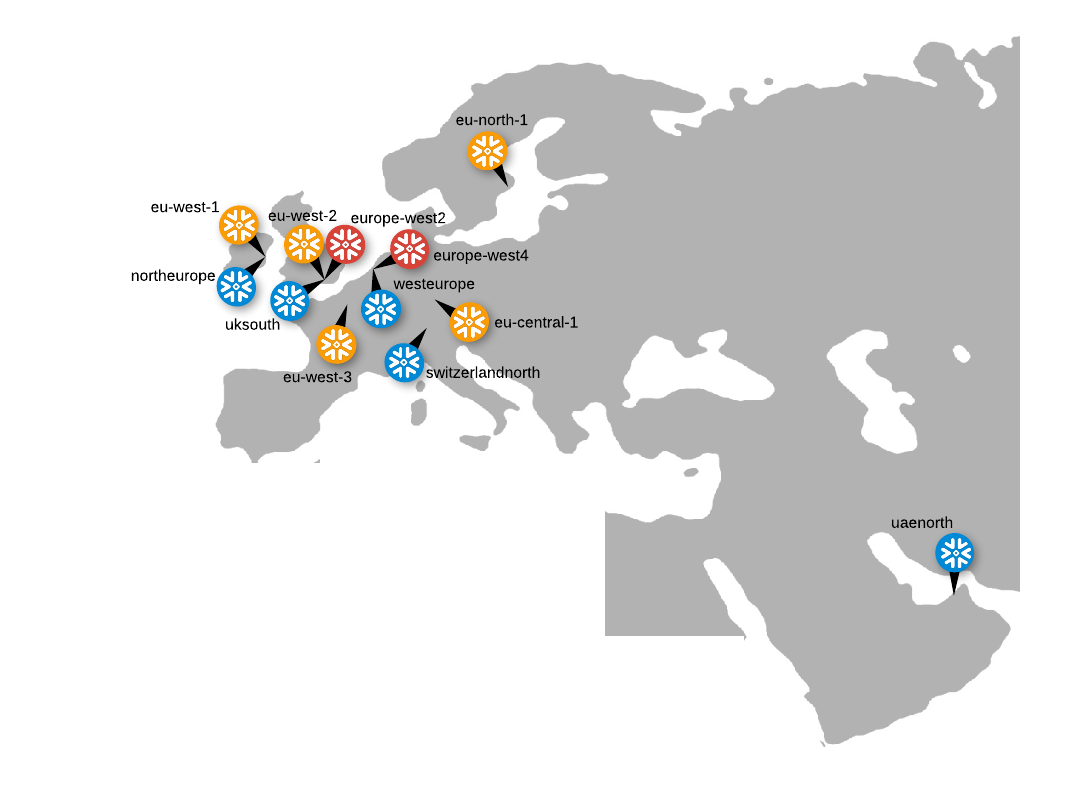
Snowflake supports the following European, Middle East, and African regions:
Cloud Platform |
Cloud Region ID [1] |
Region Name |
Additional Notes |
|---|---|---|---|
Amazon Web Services (AWS) |
|||
af-south-1 |
Africa (Cape Town) |
||
eu-central-1 |
EU (Frankfurt) |
||
eu-central-2 |
EU (Zurich) |
||
eu-north-1 |
EU (Stockholm) |
||
eu-west-1 |
EU (Ireland) |
||
eu-west-2 |
Europe (London) |
||
eu-west-3 |
EU (Paris) |
||
me-central-1 |
Middle East (UAE) |
||
Google Cloud Platform (GCP) |
|||
europe-west2 |
Europe West2 (London) |
||
europe-west3 |
Europe West3 (Frankfurt) |
||
europe-west4 |
Europe West4 (Netherlands) |
||
me-central2 |
Middle East Central2 (Dammam) |
||
Microsoft Azure |
|||
northeurope |
North Europe (Ireland) |
||
swedencentral |
Sweden Central (Gävle) |
||
switzerlandnorth |
Switzerland North (Zurich) |
||
westeurope |
West Europe (Netherlands) |
||
uaenorth |
UAE North (Dubai) |
||
uksouth |
UK South (London) |
||
[1] See the map preceding this table for the location of each supported region, labeled by cloud region ID.
Asia Pacific and China¶
These regions are supported for organizations that prefer or require their data to be stored in Japan, Korea, India, Southeast Asia, Australia, and China. Multiple regions are provided to allow your organization to meet its individual compliance and data sovereignty requirements.
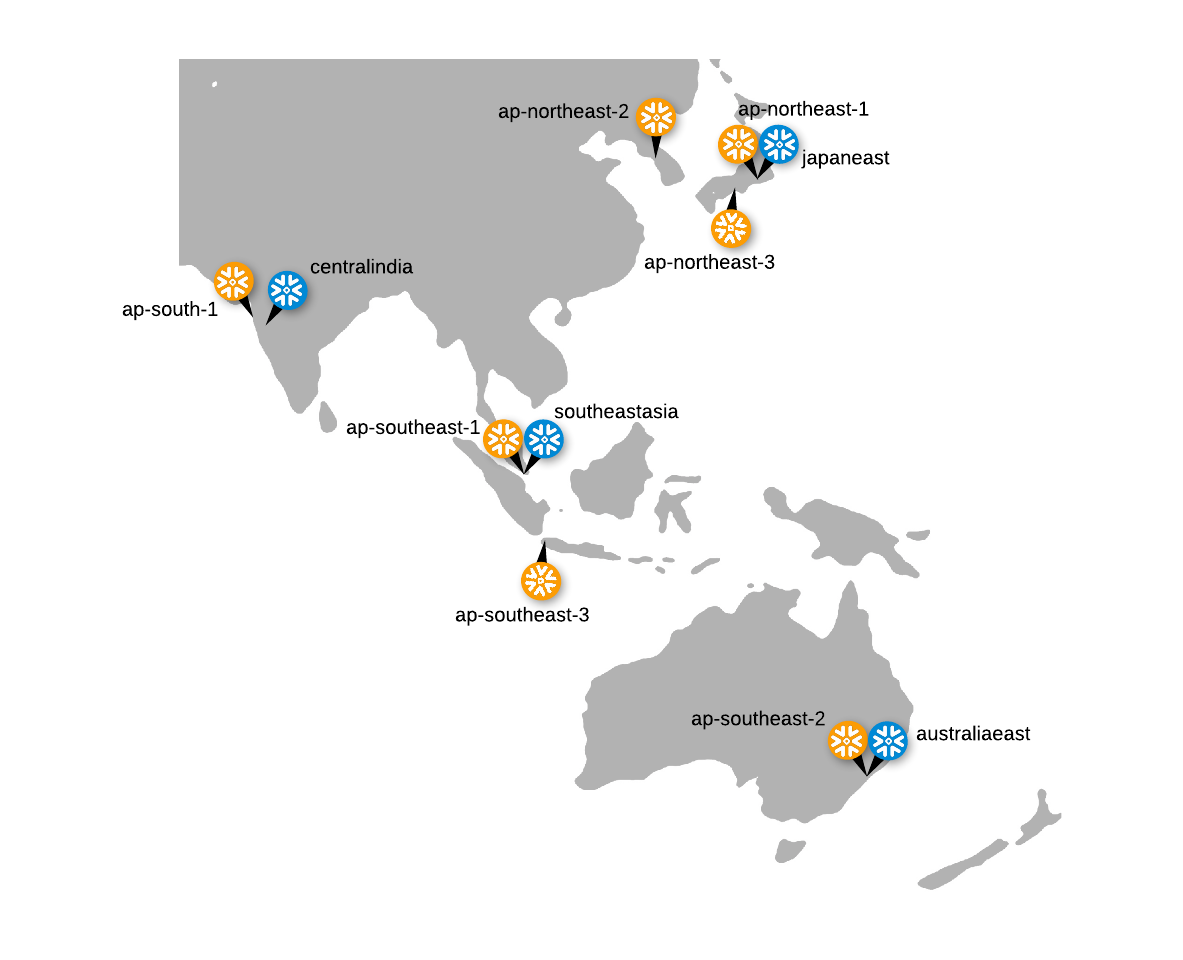
Snowflake supports the following Asia Pacific and China regions:
Cloud Platform |
Cloud Region ID [1] |
Region Name |
Additional Notes |
|---|---|---|---|
Amazon Web Services (AWS) |
|||
ap-northeast-1 |
Asia Pacific (Tokyo) |
Completed assessment and supports compliance with the Japanese government’s Information System Security Management and Assessment Program (ISMAP) |
|
ap-northeast-2 |
Asia Pacific (Seoul) |
||
ap-northeast-3 |
Asia Pacific (Osaka) |
Completed assessment and supports compliance with ISMAP |
|
ap-south-1 |
Asia Pacific (Mumbai) |
||
ap-southeast-1 |
Asia Pacific (Singapore) |
||
ap-southeast-2 |
Asia Pacific (Sydney) |
Completed assessment and supports compliance with the Australian government’s Infosec Registered Assessors Program (IRAP) - Protected |
|
ap-southeast-3 |
Asia Pacific (Jakarta) |
||
cn-northwest-1 |
China (Ningxia) |
The China region is separate from other Snowflake regions.
It utilizes a separate domain name
( Additionally, customers cannot use self-service to create their initial account in the China region. Instead, they must request the account through DCC. Once the initial account is created within their org, they can create additional accounts in the org using all other supported methods. Customers with existing Snowflake accounts are not able to access resources in the China region, and vice versa. Some features might not be available in the China region. |
|
Google Cloud Platform (GCP) |
|||
australia-southeast2 |
Australia Southeast 2 (Melbourne) |
||
Microsoft Azure |
|||
australiaeast |
Australia East (New South Wales) |
Completed assessment and supports compliance with IRAP - Protected |
|
centralindia |
Central India (Pune) |
||
japaneast |
Japan East (Tokyo) |
Completed assessment and supports compliance with ISMAP |
|
koreacentral |
Korea Central (Seoul) |
||
southeastasia |
Southeast Asia (Singapore) |
||
[1] See the map preceding this table for the location of each supported region, labeled by cloud region ID.
Region time zones for support¶
Snowflake supports multiple editions with each edition offering different levels of service.
Effective May 1, 2020:
All new accounts, regardless of Snowflake Edition, receive Premier support, which includes 24/7 coverage.
Standard Edition accounts that were provisioned before this date will continue to receive Standard support until the accounts are transitioned to Premier support.
Standard support hours are Monday - Friday, 6:00 AM - 6:00 PM, across all regions, but the time zones vary depending on the geographic location of the region:
- North America:
Pacific Time (PST or PDT)
- Europe, Middle East, & Africa:
Central Europe Time (CET or CEST)
- Asia Pacific:
Australian Eastern Time (AEST or AEDT)
Differences between regions¶
Snowflake features and services are identical across regions except for some newly-introduced features (based on cloud platform or region). However, there are some differences in unit costs for credits and data storage between regions.
Another factor that impacts unit costs is whether your Snowflake account is On Demand or Capacity.
For more information about pricing as it pertains to a specific region and account type, see the pricing page (on the Snowflake website).
View a list of regions available for an organization¶
An organization administrator can view a list of regions available for an organization through Snowsight or using SQL:
- Snowsight:
In the navigation menu, select Admin » Accounts, and then select + Account. Browse through Region.
- SQL:
Execute the SHOW REGIONS command.
Considerations for choosing a region for your account¶
When you request a Snowflake account, either through self-service or a Snowflake representative, you can choose the region where the account is located. For example, you can decide to locate an account in a particular region on a particular cloud platform to address latency concerns and/or provide additional backup and disaster recovery beyond the standard recovery support provided by Snowflake. Snowflake does not place any restrictions on the region where you choose to locate each account.
If latency is a concern, you should choose the available region with the closest geographic proximity to your end users; however, this might have cost implications, due to pricing differences between the regions. For more details, see the pricing page (on the Snowflake website).
If you are a government agency or a commercial organization that must comply with specific privacy and security requirements of the US government, you can choose between two dedicated government regions provided by Snowflake.
Important
Regions do not limit user access to Snowflake; they only dictate the geographic location where data is stored and compute resources are provisioned.
In addition, Snowflake does not move data between accounts, so any data in an account in a region remains in the region unless users explicitly choose to copy, move, or replicate the data.
Specify region information in your account hostname¶
A hostname for a Snowflake account starts with an account identifier and ends with the Snowflake domain
(snowflakecomputing.com). Snowflake supports two formats to use as the
account identifier in your hostname:
Account name (preferred)
Account locator
Important
If you choose the account locator as your account identifier, you might need to include additional segments in the locator that specify the cloud region and cloud platform where your account is hosted.
For more details, see Format 2: Account locator in a region.

